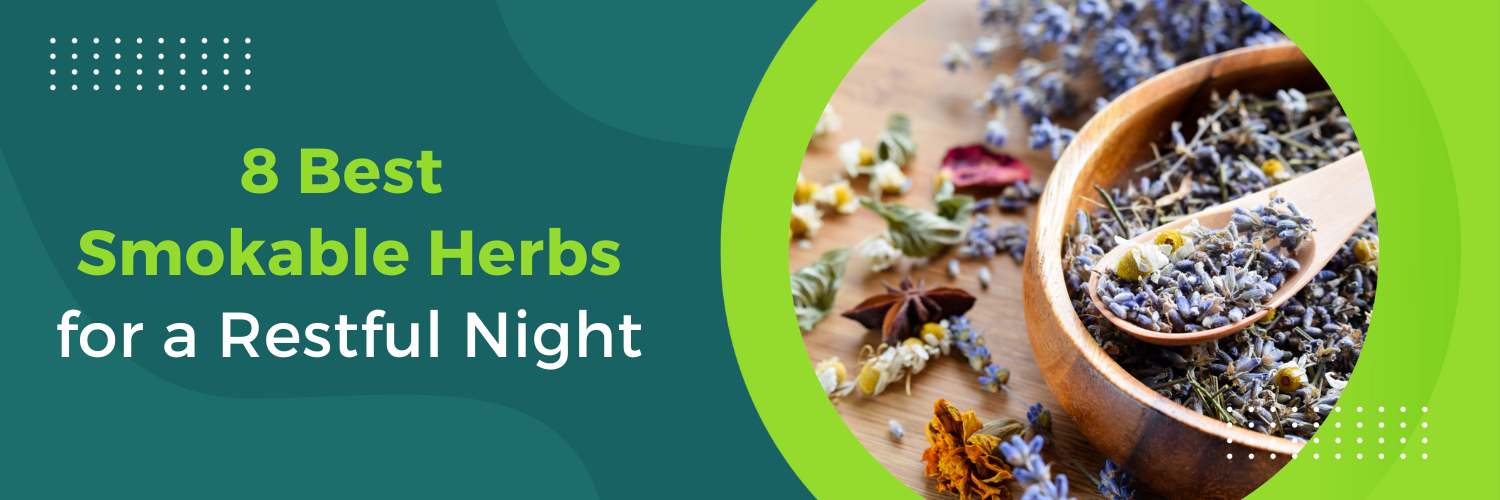Smokable Herbs for Sleep
Indeed, smokable herbs have a rich history that spans various cultures and civilizations. They have been used for a multitude of purposes ranging from medicinal, and spiritual, to recreational uses. In this context, we will focus on their application as sleep aids.
What are Smokable Herbs?
Smokable herbs refer to a variety of plants that, when dried and combusted, release certain compounds into the air which, when inhaled, can have various effects on the body and mind. These effects are mainly due to the unique properties of each herb, which can vary from calming to stimulating, pain-relieving, and more.
From the shamanistic practices of ancient tribes to traditional Chinese medicine and Ayurveda, smokable herbs have a long history of use. For instance, Native Americans have a tradition of smoking herbs in ceremonial practices, both as a way of carrying prayers to the heavens and for their potential healing and calming effects. Similarly, in ancient Chinese medicine, a practice known as ‘moxibustion’ involved burning certain herbs close to particular points on the body to promote healing and wellness.
Today, the tradition of smoking herbs continues, albeit for a broader range of applications. Smokable herbs are now commonly used as natural remedies to support physical and mental health. With the increasing interest in holistic and natural wellness practices, many are turning to these herbs as a way to ease anxiety, promote relaxation, and most importantly for our topic, enhance sleep.
How Do Smokable Herbs Promote Sleep?
Certain herbs have properties that interact with the body’s physiological processes, supporting the initiation and maintenance of sleep. This is often due to their interaction with the nervous system, where they may affect neurotransmitter activity, promoting relaxation and sedation.
Many smokable herbs, such as chamomile, contain compounds like apigenin, which binds to benzodiazepine receptors in the brain. This interaction helps slow down nerve activity, promoting a sense of calm and relaxation, which can aid in falling asleep. Similarly, other herbs may influence the levels of hormones like melatonin, which plays a critical role in regulating sleep-wake cycles.
Potential Benefits of Using Herbs for Sleep
Using herbs for sleep has its advantages. First and foremost, these are natural substances, often without the unwanted side effects that some over-the-counter and prescription sleep medications may have. Regular use of these herbs can potentially help reduce sleep onset latency, prevent nighttime awakenings, and improve overall sleep quality. This, in turn, can positively affect daytime functioning and overall health and well-being.
Here is a list of some common benefits associated with the use of herbs for sleep:
Promotes Relaxation
Many herbs have natural properties that promote relaxation and help calm the mind and body, making it easier to fall asleep.
- Example: Chamomile is known for its calming properties and can help reduce anxiety and promote a sense of tranquility.
Improves Sleep Quality
Some herbs have compounds that can enhance the quality of sleep, leading to a more restful and rejuvenating experience.
- Example: Lavender has been shown to improve sleep quality by increasing deep sleep and reducing the amount of time spent awake during the night.
Reduces Insomnia Symptoms
Certain herbs can help alleviate symptoms of insomnia, such as difficulty falling asleep or staying asleep throughout the night.
- Example: Passionflower has been used as a natural remedy for insomnia, helping to induce sleep and improve sleep duration.
Relieves Anxiety and Stress
Many herbs used for sleep have anxiolytic properties, meaning they can reduce anxiety and stress, creating a more relaxed state conducive to sleep.
- Example: Valerian root has been traditionally used to relieve anxiety and promote a calm mental state, making it easier to achieve restful sleep.
Supports Healthy Sleep-Wake Cycles
Some herbs can help regulate sleep-wake cycles, promoting a more consistent sleep schedule and improving overall sleep patterns.
- Example: CBD has been studied for its potential to regulate sleep cycles and improve insomnia symptoms.
Non-Habit Forming
Unlike some prescription sleep medications, herbs used for sleep are generally considered non-habit forming, reducing the risk of dependence or withdrawal symptoms.
- Example: Lemon balm is a gentle herb that can be used to promote sleep without the risk of addiction or dependence.
It’s important to note that the specific benefits of each herb may vary, and individual responses can differ. It’s advisable to experiment with different herbs and consult with a healthcare professional for personalized recommendations based on your specific needs and health condition.
The 8 Best Smokable Herbs for a Restful Night
While many herbs can promote relaxation and sleep, here are eight that stand out for their potency and effectiveness. Please note that everyone’s response to these herbs can vary, and what works best for you may depend on your individual needs and health status.
- Chamomile: Chamomile is a popular herb known for its calming properties. When smoked, it releases compounds that can help reduce anxiety and promote sleep.
- Lavender: Lavender has long been recognized for its relaxation and sleep-promoting effects. The aroma released when lavender is smoked can provide a sense of calm and peace, which can aid in sleep.
- Passionflower: Passionflower is another herb with potent calming properties. It can be smoked to relieve anxiety and insomnia, making it easier to fall asleep and stay asleep throughout the night.
- Mugwort: Mugwort has been traditionally used in many cultures for its dream-enhancing properties. It’s believed to promote restful and vivid dreams when smoked before bed.
- CBD: CBD, or cannabidiol, is derived from the hemp plant. It’s not psychoactive, meaning it won’t get you ‘high’, but it has been praised for its potential to reduce anxiety and improve sleep.
- Catnip: While catnip is famously known for its effects on cats, it also has benefits for humans. When smoked, it can have a mild sedative effect, promoting relaxation and sleep.
- Lemon Balm: Lemon balm is a member of the mint family with a pleasant, citrusy scent. It has been used for centuries to relieve anxiety and promote sleep.
- Blue Lotus: Known for its mystical properties, blue lotus is often used as a sleep aid and anxiety reliever. When smoked, it provides a soothing, calming effect which can aid in sleep onset and quality.
Safety Considerations and Possible Side Effects of Smoking Herbs for Sleep
While smoking herbs can potentially offer many benefits, it’s important to consider safety precautions and potential side effects. Each herb is different and can affect individuals in unique ways.
General Safety Guidelines
When smoking herbs, it’s crucial to ensure the product’s quality. Always source herbs from a reputable supplier to avoid contaminants that could potentially be harmful. If you have any pre-existing health conditions, particularly respiratory issues, or if you are taking any medication, consult your healthcare provider before starting any new regimen.
Possible Side Effects of Each Herb
Each herb can have different side effects. For instance, chamomile is generally considered safe but can cause allergic reactions in some people, especially those who are allergic to ragweed. Other common side effects across many herbs may include dry mouth, throat irritation, and in some cases, dizziness. It’s important to start with small amounts to see how your body reacts and stop using the herb if you notice any adverse effects.
Tips to Minimize Potential Risks
Here are some tips to minimize potential risks:
- Begin with a small amount: Starting with a small amount can help your body adjust to the herb and minimize potential side effects.
- Monitor your body’s reaction: Pay attention to how your body responds after smoking the herb. If you experience any discomfort or adverse reactions, discontinue use.
- Avoid smoking before operating machinery: Some herbs can cause drowsiness, so it’s best to avoid them before driving or operating machinery.
- Consider other methods: If you’re not comfortable with smoking, consider other methods of using these herbs such as teas or aromatherapy.
Remember, while smokable herbs can promote sleep and relaxation, they aren’t a cure-all solution. Persistent sleep problems might indicate an underlying health issue, so it’s important to consult a healthcare professional if your sleep doesn’t improve over time.
Conclusion
Sleep is a crucial aspect of our overall well-being, and exploring natural methods like smoking herbs can provide a holistic approach to achieving a restful night’s sleep. However, it’s important to remember that individual responses to these herbs may vary. It’s recommended to start with small amounts and listen to your body’s signals. It’s also worth noting that while these herbs can be helpful, they should not replace healthy sleep practices or professional medical advice for chronic sleep issues. If you’re currently on medication, pregnant, nursing, or have a chronic health condition, it’s essential to consult with your healthcare provider before incorporating these herbs into your routine.
To further explore the potential benefits of CBD for sleep and find other high-quality CBD products, we recommend checking out the offerings from Leaf Alleviate. They provide a range of herbal products specifically formulated to support relaxation and restful sleep. Visit their website to learn more about their offerings and make an informed choice for your sleep journey.
FAQs
Q: Can I combine these herbs for sleep?
Yes, several herbs can be combined for added benefits. However, it’s essential to research and consult a professional to ensure the combination is safe.
Q: How often should I smoke these herbs for best results?
The frequency can depend on various factors, including the specific herb and individual needs. Some herbs may be beneficial when smoked a few hours before bed, while others might be more effective when used regularly.
Q: Can I smoke these herbs if I’m pregnant or nursing?
Pregnant and nursing women should always consult a healthcare provider before using any new substances, including herbs.
Q: Are there any long-term effects of smoking these herbs?
While these herbs are generally safe for use, long-term effects can vary depending on the specific herb and individual health conditions.
Q: Where can I purchase these herbs safely and legally?
Most herbs can be purchased from health food stores, online retailers, or directly from reputable growers. Always ensure that the source is credible and provides high-quality products.














